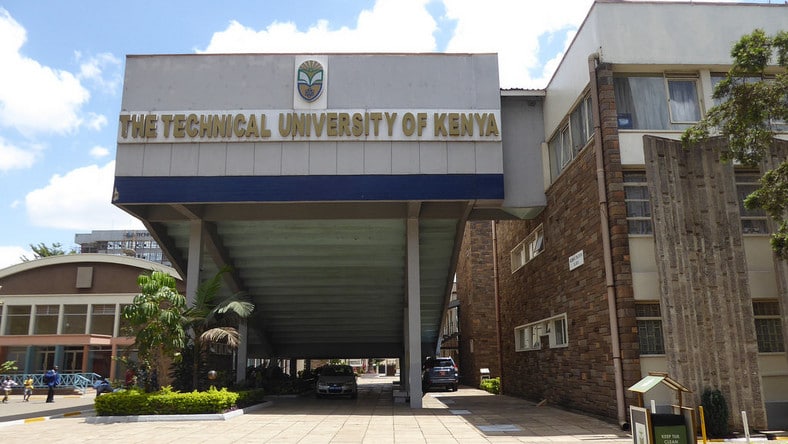The Technical University of Kenya (TUK) is one of the leading institutions in Kenya, offering quality technical and vocational education.
As the 2025/2026 academic year approaches, many prospective students are looking for the latest TUK fee structure to help them plan financially.
This article provides a detailed breakdown of the Technical University of Kenya fees structure for different programs, including degree, diploma, and certificate courses.
Overview of TUK Fees Structure 2025/2026
The Technical University of Kenya (TUK) offers a wide range of programs under different faculties. The fees for each program vary depending on the level of study (degree, diploma, or certificate) and the specific course requirements.
General Fee Estimates for 2025/2026
| Program Level | Estimated Fees Per Year (KES) |
|---|---|
| Bachelor’s Degree | Ksh 120,000 – 180,000 |
| Diploma Programs | Ksh 80,000 – 120,000 |
| Certificate Programs | Ksh 50,000 – 80,000 |
| Postgraduate Programs | Ksh 150,000 – 300,000 |
Breakdown of TUK Fees by Faculty
The Technical University of Kenya has various faculties, each offering specialized programs. Below is the estimated fee structure for different schools at TUK in 2025/2026:
1. Faculty of Engineering and Built Environment
| Course | Annual Fees (KES) |
|---|---|
| Bachelor of Engineering in Civil Engineering | 160,000 – 180,000 |
| Bachelor of Technology in Electrical Engineering | 150,000 – 170,000 |
| Bachelor of Science in Mechanical Engineering | 155,000 – 175,000 |
| Diploma in Civil Engineering | 90,000 – 110,000 |
| Diploma in Mechanical Engineering | 85,000 – 100,000 |
2. Faculty of Applied Sciences and Technology
| Course | Annual Fees (KES) |
|---|---|
| Bachelor of Science in Information Technology | 140,000 – 160,000 |
| Bachelor of Science in Applied Physics | 135,000 – 150,000 |
| Diploma in Information Technology | 75,000 – 100,000 |
| Certificate in Computer Science | 50,000 – 80,000 |
3. Faculty of Social Sciences and Humanities
| Course | Annual Fees (KES) |
|---|---|
| Bachelor of Arts in Communication and Media | 100,000 – 130,000 |
| Bachelor of Arts in Public Administration | 90,000 – 120,000 |
| Diploma in Journalism and Mass Communication | 80,000 – 100,000 |
| Certificate in Public Relations | 50,000 – 75,000 |
4. Faculty of Business and Economics
| Course | Annual Fees (KES) |
|---|---|
| Bachelor of Commerce | 120,000 – 150,000 |
| Bachelor of Business Administration | 110,000 – 140,000 |
| Diploma in Business Management | 80,000 – 100,000 |
| Certificate in Entrepreneurship | 60,000 – 80,000 |
Other Fees and Additional Charges
Besides tuition, students at TUK are required to pay other fees, including:
- Registration Fee: Ksh 2,000 – 5,000 (one-time)
- Examination Fee: Ksh 5,000-10,000 per semester
- Library Fee: Ksh 2,000 – 5,000 per semester
- Student ID Fee: Ksh 1,000 (one-time)
- Accommodation Fee: Ksh 10,000 – 30,000 per semester (for on-campus housing)
Payment Options for TUK Fees
Students can pay their fees through the following methods:
- Bank Deposits: Payments can be made through designated university bank accounts.
- M-Pesa Paybill: The university provides a Paybill number for easy mobile payments.
- Direct Cash Payment at the University Finance Office—only for specific cases.
Note: Fees should be paid before the start of each semester to avoid penalties.
How to Apply to TUK for the 2025/2026 Academic Year
Prospective students who wish to join TUK should follow these steps:
- Visit the TUK website. Check available programs and admission requirements.
- Fill out the online application form and submit all required details accurately.
- Pay the application fee. The processing fee is Ksh 2,000 (non-refundable).
- Submit Required Documents: Academic transcripts, national ID, and passport-size photos.
- Wait for Admission Confirmation: The university will contact successful applicants.
For official applications, visit: www.tukenya.ac.ke
Why Choose the Technical University of Kenya?
- Industry-Focused Courses: programs designed to meet market demands.
- Affordable Tuition: Competitive fees compared to other universities.
- State-of-the-Art Facilities: Modern labs, libraries, and research centers.
- Strong Industry Partnerships—Internship and job placement opportunities.
- Flexible Study Modes: Full-time, part-time, and distance learning options.
Conclusion
The Technical University of Kenya (TUK) continues to offer affordable and high-quality education. By understanding the TUK fee structure for 2025/2026, students can plan their finances accordingly.
For the most accurate and up-to-date fees, always refer to the official university website or visit the admissions office.
For more details, visit: www.tukenya.ac.ke
Related articles
- Top Colleges in Tanzania Set Unparalleled Academic Standards Today
- Top 10 Best Colleges in South Africa Offering World-Class Education
- Top10 Most Expensive Private Schools in South Africa: The Cost of Elite Education
- Discover South Africa’s Top 10 Most Expensive Colleges Today
- 10 South Africa’s Premier Universities Set Unrivaled Academic Excellence Standards


